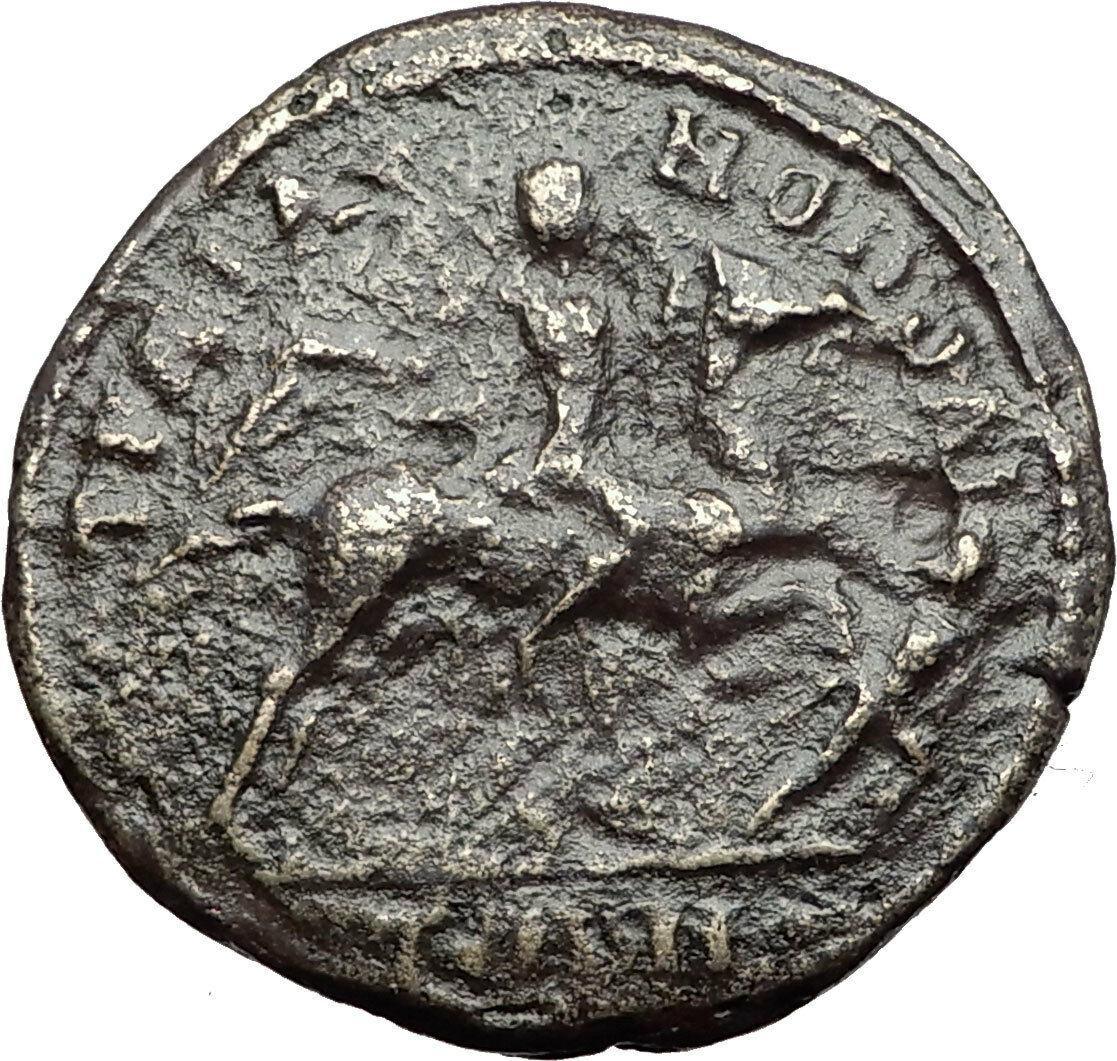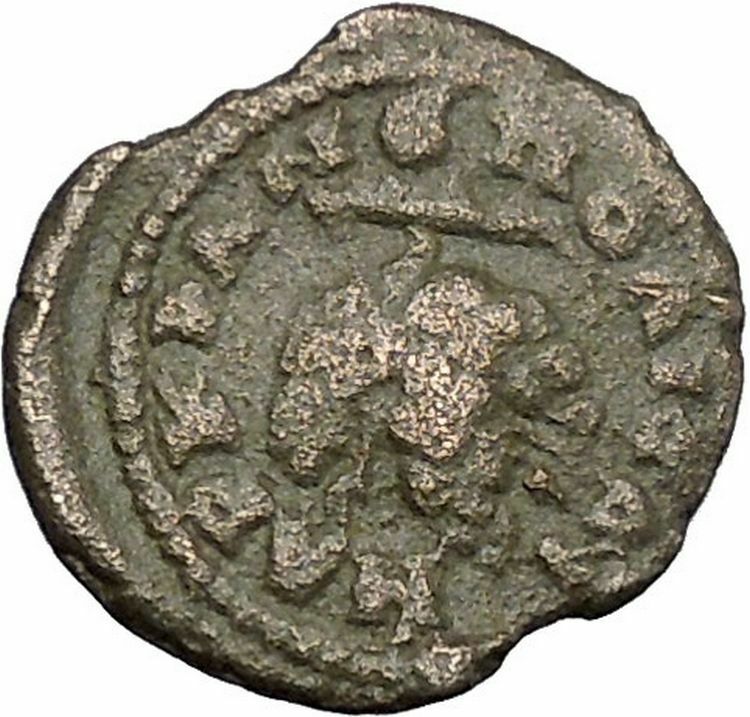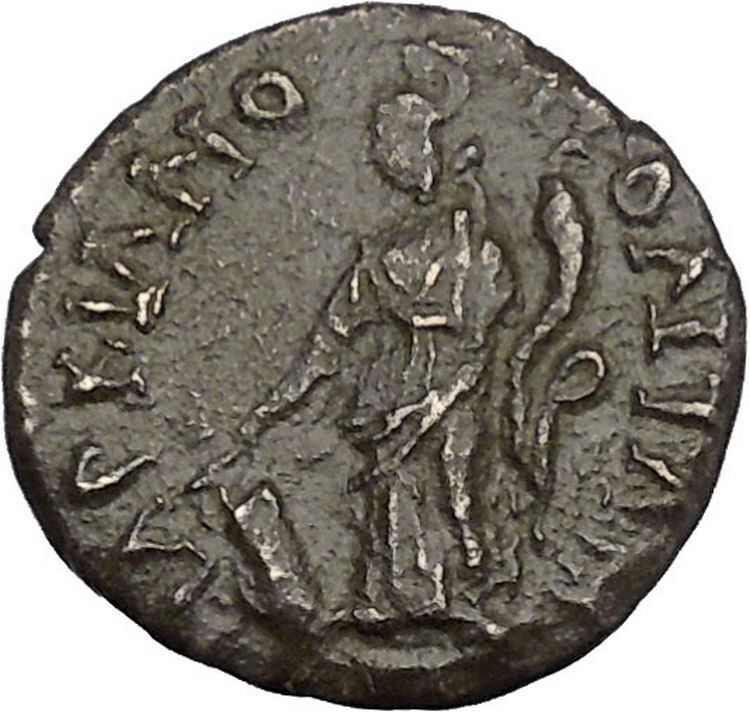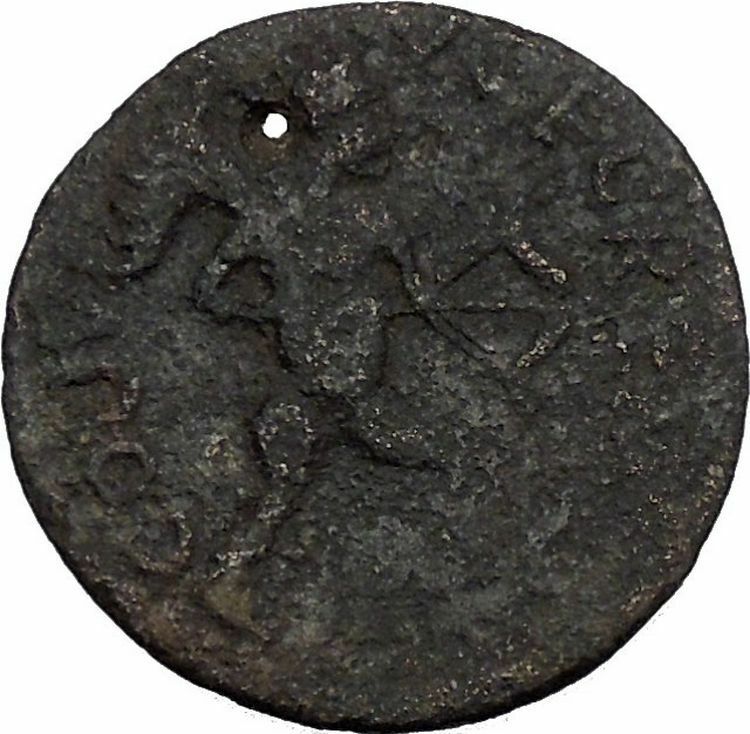|
Severus Alexander – Roman Emperor: 222-235 A.D. –
Bronze 24mm (9.66 grams) of Stobi in Macedonia
Radiate, draped and cuirassed bust left.
Hades sitting backwards in quadriga galloping right, carrying off struggling Persephone.
You are bidding on the exact item pictured, provided with a Certificate of Authenticity and Lifetime Guarantee of Authenticity.
The story of her abduction is traditionally referred to as the Rape of Persephone . The myth is absent in Homer and first appears in Hesiod ‘s Theogony: “Also he [Zeus] came to the bed of all-nourishing Demeter, and she bore white-armed Persephone whom Aidoneus (Hades) carried off from her mother; but wise Zeus gave her to him.” Unlike every other offspring of an Olympian pairing of deities, Persephone has no stable position at Olympus. Persephone used to live far away from the other deities, a goddess within Nature herself before the days of planting seeds and nurturing plants. In the Olympian telling, the gods Hermes , Ares, Apollo, and Hephaestus, had all wooed Persephone; but Demeter rejected all their gifts and hid her daughter away from the company of the Olympian deities.
Thus, beautiful Persephone lived a peaceful life until Hades, the Lord of the Underworld, fell in love with her. It is said that Zeus advised him to carry her off, as her mother Demeter was not likely to allow. She was innocently picking flowers with some nymphs —Athena, and Artemis, the Homeric hymn says—or Leucippe, or Oceanids —in a field when Hades came to abduct her, bursting through a cleft in the earth. The place where Persephone was said to have been carried off is different in the various local traditions. The Sicilians believed that Hades found her in the meadows near Enna. The Eleusinians mentioned the Nysaean plane in Boeotia and said that Persephone had descended with Hades into the lower world at the entrance of the western Oceanus . Later accounts place the rape near Attica or at Erineus near Eleusis . The Cretans thought that their own island was the scene of the rape. Demeter searched desperately with torches for her lost daughter all over the world. In some versions she forbids the earth to produce, or she neglects the earth and in the depth of her despair she causes nothing to grow. Helios , the sun, who sees everything, eventually told Demeter what had happened and at length she discovered the place of her abode.
Finally, Zeus, pressed by the cries of the hungry people and by the other deities who also heard their anguish, forced Hades to return Persephone. However, it was a rule of the Fates that whoever consumed food or drink in the Underworld was doomed to spend eternity there. Before Persephone was released to Hermes, who had been sent to retrieve her, Hades tricked her into eating pomegranate seeds, (four or six according to the telling) which forced her to return to the underworld for a period each year. The seeds correspond to the dry summer months in Greece, usually one third of the year (four months) when Persephone (Kore) is absent. In some versions, Ascalaphus informed the other deities that Persephone had eaten the pomegranate seeds. When Demeter and her daughter were reunited, the Earth flourished with vegetation and color, but for some months each year, when Persephone returned to the underworld, the earth once again became a barren realm. This is an origin story to explain the seasons.
In an earlier version, Hecate rescued Persephone. On an Attic red-figured bell krater of ca 440 BC in the Metropolitan Museum of Art , Persephone is rising as if up stairs from a cleft in the earth, while Hermes stands aside; Hecate, holding two torches, looks back as she leads her to the enthroned Demeter.
The tenth-century Byzantine encyclopedia Suda, s.v. “Macaria“, introduces a goddess of a blessed afterlife assured to Orphic mystery initiates. This Macaria is asserted to be the daughter of Hades and Persephone, though there is no previous mention of her.
SEVERUS ALEXANDERRR
 Augustus: A.D. 222-235 Augustus: A.D. 222-235
Caesar: A.D. 221-222 under Elagabalus
Son of Julia Mamaea
Husband of Orbiana
Grandson of Julia Maesa
Nephew of Julia Soaemias
Cousin of Elagabalus
Second-cousin of Caracalla and Geta
Great-newphew of Septimius Severus and Julia Domna
Marcus Aurelius Severus Alexander (October 1, 208–March 18, 235 AD), commonly called Alexander Severus, was the last Roman emperor (11 March 222–235) of the Severan dynasty . Alexander Severus succeeded his cousin, Elagabalus upon the latter’s assassination in 222 AD, and was ultimately assassinated himself, marking the epoch event for the Crisis of the Third Century —nearly fifty years of disorder, Roman civil wars, economic chaos, regional rebellions, and external threats that brought the Empire to near-collapse.
Alexander Severus was the heir apparent to his cousin, the eighteen-year-old Emperor who had been murdered along with his mother by his own guards—and as a mark of contempt, had their remains cast into the Tiber river . He and his cousin were both grandsons of the influential and powerful Julia Maesa , who had arranged for Elagabalus’ acclamation as Emperor by the famed Third Gallic Legion .
A rumor of Alexander’s death circulated, triggering the assassination of Elagabalus.
Alexander’s reign was marked by troubles. In military conflict against the rising Sassanid Empire , there are mixed accounts, though the Sassanid threat was checked. However, when campaigning against Germanic tribes of Germania , Alexander Severus apparently alienated his legions by trying diplomacy and bribery, and they assassinated him.
Life
Alexander was born with the name Marcus Julius Gessius Bassianus Alexianus. Alexander’s father, Marcus Julius Gessius Marcianus was a Syrian Promagistrate . His mother Julia Avita Mamaea was the second daughter of Julia Maesa and Syrian noble Julius Avitus and maternal aunt of Emperor Elagabalus . He had an elder sister called Theoclia and little is known about her. Alexander’s maternal great-aunt was empress Julia Domna (also Maesa’s younger sister) and his great-uncle in marriage was emperor Lucius Septimius Severus . Emperors Caracalla and Publius Septimius Geta , were his mother’s maternal cousins. In 221, Alexander’s grandmother, Maesa, persuaded the emperor to adopt his cousin as successor and make him Caesar and Bassianus changed his name to Alexander. In the following year, on March 11, Elagabalus was murdered, and Alexander was proclaimed emperor by the Praetorians and accepted by the Senate.
When Alexander became emperor, he was young, amiable, well-meaning, and entirely under the dominion of his mother. Julia Mamaea was a woman of many virtues, and she surrounded the young emperor with wise counsellors. She watched over the development of her son’s character and improved the tone of the administration. On the other hand, she was inordinately jealous. She also alienated the army by extreme parsimony, and neither she nor her son were strong enough to impose military discipline. Mutinies became frequent in all parts of the empire; to one of them the life of the jurist and praetorian praefect Ulpian was sacrificed; another compelled the retirement of Cassius Dio from his command.
On the whole, however, the reign of Alexander was prosperous until the rise, in the east, of the Sassanids . Of the war that followed there are various accounts. (Mommsen leans to that which is least favourable to the Romans). According to Alexander’s own dispatch to the senate, he gained great victories. At all events, though the Sassanids were checked for the time, the conduct of the Roman army showed an extraordinary lack of discipline. The emperor returned to Rome and celebrated a triumph in 233.
The following year he was called to face German invaders in Gaul, who had breached the Rhine frontier in several places, destroying forts and over-running the countryside. Alexander mustered his forces, bringing legions from the eastern provinces, and crossed the Rhine into Germany on a pontoon bridge. Initially he attempted to buy the German tribes off, so as to gain time. Whether this was a wise policy or not, it caused the Roman legionaries to look down on their emperor as one who was prepared to commit unsoldierly conduct. Herodian says “in their opinion Alexander showed no honourable intention to pursue the war and preferred a life of ease, when he should have marched out to punish the Germans for their previous insolence”. These circumstances drove the army to look for a new leader. They chose Gaius Iulius Verus Maximinus , a Thracian soldier who had worked his way up through the ranks.
Following the nomination of Maximinus as emperor, Alexander was slain (on either March 18 or March 19, 235), together with his mother, in a mutiny of the Primigenia Legio XXII . These assassinations secured the throne for Maximinus.
The death of Alexander is considered as the end of the Principate system established by Augustus . Although the Principate continued in theory until the reign of Diocletian , Alexander Severus’ death signalled the beginning of the chaotic period known as the Crisis of the Third Century which weakened the empire considerably.
Legacy
Alexander was the last of the Syrian emperors. Under the influence of his mother, he did much to improve the morals and condition of the people. His advisers were men like the famous jurist Ulpian, the historian Cassius Dio and a select board of sixteen senators; a municipal council of fourteen assisted the urban praefect in administering the affairs of the fourteen districts of Rome. The luxury and extravagance that had formerly been so prevalent at the court were put down; the standard of the coinage was raised; taxes were lightened; literature, art and science were encouraged; the lot of the soldiers was improved; and, for the convenience of the people, loan offices were instituted for lending money at a moderate rate of interest.
In religious matters Alexander preserved an open mind. It is said that he was desirous of erecting a temple to the founder of Christianity , but was dissuaded by the pagan priests.
Marriage
Alexander was married three times. His most famous wife was Sallustia Orbiana , Augusta , whom he married in 225. He divorced and exiled her in 227, after her father, Seius Sallustius , was executed for attempting to assassinate the emperor. Another wife was Sulpicia Memmia. Her father was a man of consular rank; her grandfather’s name was Catulus.
|





 Augustus: A.D. 222-235
Augustus: A.D. 222-235


